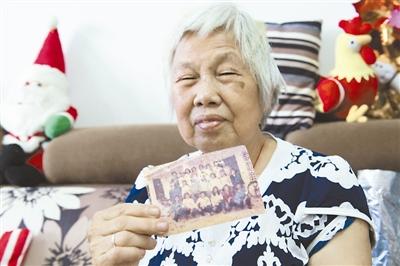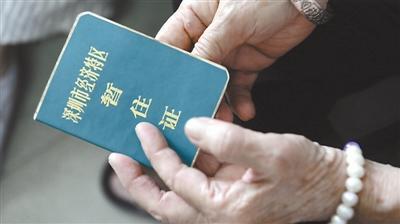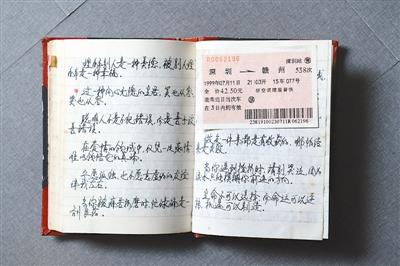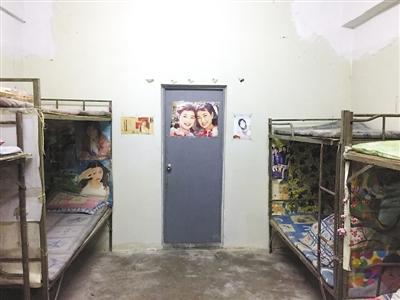40 years of special economic zones in miniature: Shenzhen memories of two generations of working girls

The photo in Jiang Huiqun’s hand is a photo of her and the working girl of that year.
There is no road in the world, and more people will become roads.
40 years of reform and opening up, magnificent, stormy. There is a special group, who changed their own destiny and their family’s destiny with their youth and sweat, and promoted the vigorous development of China’s economy. Their laughter and tears affect the joys and sorrows of countless families; Their dedication and tenacity have merged into a magnificent song of the times in China’s reform and opening up.
They are thousands of migrant workers in Qian Qian.
Today, standing at the node of 40 years of reform and opening up, let us remember the unknown workers in the history of these republics.
Jiang Huiqun and Zhang Meimei are the epitome of ten million working girls in Qian Qian. This article tells about their simple life, in order to pay tribute to that hard and splendid time and to that great era.
-Inscription

Temporary residence permit of Shenzhen Special Economic Zone preserved by Jiang Huiqun.
Jiang Huiqun, born in June, 1946, is from Shiyan Commune, Bao ‘an County, Guangdong Province, and one of the earliest 25 working girls in China since the reform and opening up.
Zhang Meimei, born in October, 1972, is from Nanxing Village, Qiaoxu Town, Guigang City, Guangxi Zhuang Autonomous Region, and one of the 100,000 post-70s working girls in Qian Qian, China.

A letter from Zhang Meimei.
Two people who have never met each other have a wonderful intersection in the city of Shenzhen-the former site of Jiang Huiqun’s work, "Shiyan Commune Shangwu Brigade Hotline Circle Factory", is now the location of the first labor museum in China; Zhang Meimei’s 77 letters from home and the Xinhua Dictionary she used are displayed in the Labor Museum and meet the audience every day.
Jiang Huiqun and Zhang Meimei, two generations of working girls, participated in the construction of the city of Shenzhen and witnessed the legend and rise of small fishing villages in the south. And they are also carved into the memory of time by this city in its own way.

Notebooks displayed in the Labor Museum retain the "chicken soup for the soul" and train tickets of the workers in those years.
In 1978, Jiang Huiqun entered the first "Three Supplements" enterprise in the history of New China, and his salary was three times higher than his income from farming!
Jiang Huiqun never thought that she would become the first batch of working girls since the reform and opening up. At the age of 72, when she was a child, her greatest wish was to eat and wear warm clothes. This wish, she has been obsessed with it until now.

The dormitory for female workers in those days is now a part of the Labor Museum, with posters of female stars who were popular at that time posted on the door.
At that time, the ingredients in Jiang Huiqun’s family were classified as middle peasants. Jiang Huiqun’s grandmother and mother were often criticized. At that time, she was still a teenager, standing by, scared, but afraid to cry.
In 1968, Jiang Huiqun got married. From her mother’s family to her husband’s family, poverty has not changed much. Especially with three children and her father-in-law paralyzed by a stroke, the life of Jiang Huiqun’s family is even more stretched. The work points she earned in the production team are not enough every year. The husband works in a supply and marketing cooperative and earns more than 20 yuan a month. Every time I get the money, I first buy daily necessities such as salt, soy sauce and towels, and I also buy medicine for my father-in-law. Finally, the family becomes a "moonlight family".
Such days lasted until 1978. At that time, Bao ‘an County, under the jurisdiction of Shenzhen, established "Shiyan Commune Shangwu Brigade Hotline Circle Factory", which was the first "Three Supplements" enterprise in the history of new China.
"Three to one supplement" is the general name of four economic cooperation modes: processing with supplied materials, processing with supplied samples, assembling with supplied parts and compensation trade. At that time, there was a ballad in Baoan: "There are only three treasures in Baoan: flies, mosquitoes and manhole oysters. Ten houses and nine empty houses fled to Hong Kong, leaving only the old and the young at home. "
No more farming, I have to go to work! The salary at work is three times higher than the income from farming in a year! Such a fresh experience and such a good thing have made the local villagers all eager to try.
However, it was not easy to work in the factory. At that time, 25 women workers were recruited, and 70 to 80 people signed up. Jiang Huiqun’s husband is engaged in business in the supply and marketing cooperative, and arranged for the Hong Kong boss to invest and build a factory in the Shangyou Brigade of Shiyan Commune. Because of "attracting investment", Jiang Huiqun was able to go to work in the factory.
Jiang Huiqun, who was so happy to go to work in the factory, didn’t know that it was not easy for the company she worked for to finally settle in the Shangwu Brigade. Because of the fear of "cutting the tail of capitalism", Hong Kong businessmen talked with local departments in Baoan for half a year, and it was not until December 18, 1978 that a cooperation agreement was formally signed.
At that time, Jiang Huiqun would not have thought that December 18, 1978 would be a day in history-Chinese’s life, which was a watershed and had undergone earth-shaking changes.
On December 18, 1978, the Third Plenary Session of the Eleventh Central Committee of the Communist Party of China opened in Beijing, decided to shift the focus of the whole party’s work to economic construction, and determined the major policies of reform and opening up. Since then, China has entered a new historical period of reform, opening up and socialist modernization.
From the late 1970s to the early 1980s, groups of migrant girls flocked to Shenzhen from all over the country.
Shenzhen, a hot land, appeared in front of the world at an alarming speed.
In fact, the conditions in Shenzhen at that time were very difficult. The hotline circle factory where Jiang Huiqun and his sisters go to work is to produce electric heating coils in hair dryers every day. They sit on low bamboo chairs and operate by hand, such as pedaling and hand shaking, and the equipment is old machines eliminated from Hong Kong.
At that time, life in Hong Kong on the other side of Shenzhen was unimaginable to Jiang Huiqun. She has an aunt in Hong Kong. Every time her aunt comes back from Hong Kong, it is a big day for Jiang Huiqun and her family. The snakeskin bag my aunt brought back contains food glue, clothes, useful towels and many things that are not available here in Shenzhen.
Jiang Huiqun remembers that the most popular thing is rice glue, that is, steamed white rice is dried in Hong Kong and brought over, soaked in hot water and eaten. For Jiang Huiqun, who wants to vomit after eating sweet potatoes, rice glue is the most delicious.
The Hong Kong boss came to Shenzhen to set up a factory, and Jiang Huiqun and his sisters "washed their feet and went to the fields", which was the beginning of a new life.
Zhang Meimei dropped out of school like girls of the same age in the village. In her imagination, Shenzhen is full of tall buildings, and girls are walking around the street in fashionable skirts, and she herself will soon become one of them.
When migrant girls from all over the country flocked to Shenzhen, Zhang Meimei was dreaming of being a girl in Nanxing Village, Guigang City, Guangxi.
In the 1980s, Zhang Meimei finished primary school and junior high school in the local area. At that time, she was satisfied with her life-the primary school served as the monitor and the junior high school served as the league secretary; There are five brothers and sisters in the family, and she is the second child. Although the family conditions in the village are not very good, it is no problem to fill the stomach. At that time, Zhang Meimei wrote all inspirational "chicken soup for the soul" in her diary.
After graduating from junior high school, Zhang Meimei didn’t get into a key high school, which gave the whole family a modest problem-continuing to study in an ordinary high school has little hope of being admitted to a university. The most important thing is that if Zhang Meimei wants to continue to go to school, some of her three sisters will definitely fail to go to school.
Without much hesitation, Zhang Meimei dropped out of school like girls of the same age in the village. There are two ways in front of her-waiting for a few years to get married, or going out to work for her three sisters to go to school.
Shenzhen, the hot land at that time, soon became the best choice for Zhang Meimei. In her imagination, Shenzhen is full of tall buildings, and girls are walking around the street in fashionable skirts, and she herself will soon become one of them.
At the beginning of 1991, Zhang Meimei went to work in Shangwu Caihua Flower Factory in Shiyan Town, Shenzhen. To her disappointment, Shiyan Town is almost the same as the county seat of her hometown. A street that is not wide is always dusty, and there are not many high-rise buildings in sight.
I can’t bear to look at this place in Shenzhen carefully. She will soon struggle for her life.
Caihua Flower Factory is a factory that makes fake flowers. When the machine presses the fake flowers into shape, the operator should be quick-sighted and slow down, and he may burn his hands.
With the influx of migrant girls like Zhang Meimei, in March 1989, various districts and towns in Shenzhen set up labor management stations and foreign offices to serve migrant workers. Subsequently, in April 1990, Shenzhen promulgated the Interim Provisions on Industrial Injury Insurance in Shenzhen Special Economic Zone to provide more protection for migrant workers.
After working in Shangwu Caihua Flower Factory for several months, Zhang Meimei moved to Shiyan Town Youlian Minghui Plastic Factory. Like all working girls at that time, job-hopping is just from one factory to another, and the salary may be slightly different, but life will not change in essence.
After entering Youlian Minghui Plastic Factory, Zhang Meimei and her female workers lived in the dormitory provided by the factory. The dormitory was converted from a big classroom, where 20 female workers lived. Zhang Meimei had almost no independent space.
Zhang Meimei, who has the spirit of Ah Q, seems to care nothing on the surface, but she is still depressed in her bones. She misses her parents, her family, her classmates and teachers in her hometown. Therefore, saving money for her family and writing letters to people in her hometown have become her two major hobbies.
Jiang Huiqun’s home still retains the award certificate he won when he worked in Jingpeng Hotel-a Zhang Xianjin worker’s award certificate.
When Zhang Meimei settled down in Shiyan Town, Jiang Huiqun had already left the hotline circle factory of Shangwu Brigade in Shiyan Town, and was also running for herself and her family.
Because of her husband’s job transfer, Jiang Huiqun went to Shenzhen Yingbin Hotel and Jingpeng Hotel to work.
When working in Shenzhen Yingbin Hotel, Jiang Huiqun did cleaning, which was far from making Jiang Huiqun happy when he worked in the hotline circle factory of Shangwu Brigade. For Jiang Huiqun, who was born in the countryside, cleaning is not heavy, but it is tiring.
There were many typhoons in Shenzhen. When the typhoon came, leaves and branches were blown all over the floor, and Jiang Huiqun swept the front and neglected the back. Once, the hotel had to meet important guests, just in time for a typhoon. Jiang Huiqun was "caught" by the manager on duty: "How did you do it? There are so many fallen flowers and leaves on the ground, are you hiding and being lazy? "
Jiang Huiqun, who never spared no effort in his work, cried because he was afraid that the guests would see the bad influence. After hiding and shedding tears for a while, Jiang Huiqun came out to sweep the floor again.
Having had the experience of being wronged in working, Jiang Huiqun, when working as a foreman in Jingpeng Hotel, especially understands the situation of migrant women workers. If she can bear more, she should bear as much as possible.
The young sister can hold more than 20 dirty sheets to be cleaned in the hotel, but Jiang Huiqun can hold 50 sheets in one breath-so many sheets are piled together, higher than her head, but she can go up and down several floors in one breath.
At that time, Jingpeng Hotel recruited a group of girls as waiters from Boluo County, Huizhou City, Guangdong Province. Many girls are young and have never been far away. When they first arrive, they will feel homesick and cry. Jiang Huiqun became their "intimate elder sister" and advised them: "Everyone should come out to work. It is already very good for you to have a job and a place to live."
When Jiang Huiqun arranges shifts for this group of girls, he will try his best to take care of those girls who live in other places so that they can have time to go back to visit relatives.
Jiang Huiqun’s home still retains the award certificate he won when he worked in Jingpeng Hotel-a Zhang Xianjin worker’s award certificate.
"Give workers dignity"-Shenzhen has been trying to give migrant workers a sense of belonging. In September 1996, Baoan District, Shenzhen held the first "Top Ten Outstanding Youth" and "Top Ten Foreign Young Workers" selection activities, and held them once a year thereafter. Since 2001, Shenzhen has held the selection activities of "Excellent Builders from Other Places" and "Home of Builders from Other Places", which are held every two years.
Knowing how difficult it is to go out to work, Jiang Huiqun has always maintained deep empathy for migrant workers.
Not long ago, Jiang Huiqun met a young man from other places who had just come to Shenzhen to look for a job. The young man put his backpack under his head and fell asleep on the stone bench by the roadside. Jiang Huiqun woke up the young man and told him that there was a library nearby with air conditioning, so he could rest in it temporarily. There is a snack bar outside the community looking for jobs. He can try it first.
"It is not easy for these children to leave their homes." Jiang Huiqun said that Shenzhen should treat these migrant workers well and provide them with more convenience in urban construction.
Seventy-seven precious letters in the 1990s are now displayed in the Shenzhen Labor Museum, which is not only a precious memory of Zhang Meimei, but also a testimony of that period of history.
In 1993, Jiang Huiqun ended his working career because he had to take care of his grandson. Before that, she made a special trip to Hong Kong.
Being able to go to this place that I heard of when I was a child, Jiang Huiqun felt that "the dream came true".
Hong Kong is really nice! The building is so high-although Shenzhen is also building tall buildings, it is not as high as Hong Kong and not as high as Hong Kong! Clothes in Hong Kong are also fashionable and beautiful-my aunt secretly brought some in earlier years, but they are not as beautiful as those I saw in Hong Kong!
Returning to Shenzhen with an unprecedented sense of satisfaction, Jiang Huiqun began her retirement career.
At that time, Zhang Meimei’s working career had just begun. From the correspondence with her father, brother, classmates and teachers, she realized that she had become an "example" in the hearts of her hometown people.
Father wrote to her, talking about the hardships of life at home and his concern for her:
"Mei mei: Hello. Your letter and the remittance of 2000 RMB have been received, please don’t read it! The market price, pork is more expensive than when I wrote to you last time, 7.00 yuan per catty, 8.00 yuan ~ 8.50 yuan per catty for chicken … In late autumn and winter, the weather changes greatly. Please take care of yourself and pay attention to clothing and food hygiene. "
Her teacher wrote to her and spared no effort to praise her:
"I really feel honored to know that you are excellent and can make great achievements in Shenzhen and contribute to the modernization of the motherland. There are not many students like you. I believe you will cherish your opportunities more, keep moving forward and be invincible forever. "
Her classmates wrote to her, telling her troubles in life:
"Is it easy to find a job in Shenzhen? I have contracted a salesroom now, and the business is difficult to do … I have a third sister who works in a printing factory and has nothing to do at present. I want to ask you a favor and see which factory needs people. If so, the two of us will go there … "
Her friend wrote to her complaining about the troubles caused by social changes:
"Mei mei, you are a lucky dog, but I was born in bad karma. I wanted to go to Guangdong a few years ago, but I couldn’t help it. Now that the children are older and I am 30 years old, is it difficult to find a job? At present, only the sea is the only way out … "
Seventy-seven precious letters in the 1990s are now displayed in the Shenzhen Labor Museum, which is not only a precious memory of Zhang Meimei, but also a testimony of that period of history.
In that period of history, Shenzhen was a place of pilgrimage for migrant workers. Countless people who come here or try to come here think that this land hides their future and dreams.
At that time, China had realized that this powerful team would become the backbone of China’s economic construction.
In January, 2004, "Opinions of the Central Committee of the Communist Party of China and the State Council on Several Policies to Promote Farmers’ Income Increase" clearly stated that "migrant workers working in cities have become an important part of industrial workers".
By the end of 2017, this group of migrant workers had grown to 287 million.
What Zhang Meimei didn’t expect was that volunteering brought her unexpected honor-in 2005, she won the honorary title of "Advanced Laborer in Baoan District from 2002 to 2004", which gave her the opportunity to settle in Shenzhen. She also bought a house in Shenzhen, completing the gorgeous "counterattack" in the eyes of outsiders.
So far, Zhang Meimei is still very sorry: when writing letters in a dormitory where dozens of people lived, how did she become the envy of her hometown people?
"In fact, it is a province. The female workers of our time can send money to their families, which are all saved. Unlike girls who come out to work now, they give themselves flowers first when they get paid. At that time, we didn’t spend much money except buying one or two clothes for ourselves. All the money saved was sent home. "
Although she had a hard time outside, Zhang Meimei still liked those days.
After gaining a firm foothold, Zhang Meimei’s willingness to help others since she was a student has returned. Moreover, in Shenzhen, Zhang Meimei soon had her own place to use-as a volunteer.
In 2000, a heavy rain in the south caused severe floods in many places in Guangdong, and Shenzhen also set off a wave of fundraising for disaster relief. When Zhang Meimei went shopping, she saw some people engaged in fund-raising activities, and learned that these fund-raisers are migrant workers like her, and they have a unified name called "volunteers".
After the night shift, Zhang Meimei went out to volunteer with like-minded people without sleeping. They cooperate with government departments to do publicity, health promotion and civilized persuasion, and go to nursing homes to offer love …
What Zhang Meimei didn’t expect was that volunteering brought her unexpected honor-in 2005, she won the honorary title of "Advanced Laborer in Baoan District from 2002 to 2004".
Zhang Meimei organized a volunteer service team composed of more than 100 colleagues and friends, and actively participated in various volunteer activities in Shiyan Street.
The bigger good thing is yet to come. After winning the title of "Advanced Laborer", Zhang Meimei had the opportunity to settle in Shenzhen. In 2007, she moved her hukou from Guigang, Guangxi to Shenzhen.
Subsequently, Zhang Meimei bought a house in Shenzhen with her savings mortgage loan for many years.
A girl who graduated from junior high school settled in Shenzhen with her own efforts and bought a house in Shenzhen, completing the gorgeous "counterattack" in the eyes of outsiders.
When the news came back to her hometown, Zhang Meimei became a legend and role model in the eyes of relatives and friends.
While gradually integrating into the city, migrant workers began to stand on the political stage in China.
In March, 2008, the first session of the 11th National People’s Congress saw the representatives of migrant workers-Kang Houming from Chongqing, Zhu Xueqin from Shanghai and Hu Xiaoyan from Guangdong.
In 2008, when the Labor Museum opened, 25 female migrant workers were specially invited to return to the original site of the hotline circle factory of Shangyou Brigade of Shiyan Commune, but only 19 of them finally arrived. Jiang Huiqun’s "Shenzhen Special Economic Zone Temporary Residence Permit", which has been treasured for many years, has now become a "cultural relic". Zhang Meimei thinks that the title of "migrant workers" may become a "cultural relic" in the museum one day.
Although she got a hukou and became a "new Shenzhen native", Zhang Meimei’s life in Shenzhen has not become easier.
Like many working girls, Zhang Meimei witnessed the transformation and upgrading of Shenzhen’s economy, and also witnessed the process from small to large and from large to small in her labor-intensive enterprise.
In 2013, Zhang Meimei’s company laid off employees, and only one of her and another colleague could stay. "There are old and young people in her family, which is much more difficult than me, so I resigned."
After that, she found a new job in Longhua District. When she is free, she will go back to the place where Baoan used to work and have a look. Passing by the labor museum where she searched for a long time before donating dictionaries and letters, she will also go in and have a look.
"It’s like a lifetime ago"-sitting in the bed where migrant girls used to live in the museum and stroking the posters of stars of that era, Zhang Meimei will think of the days when she was sitting in the dormitory writing letters. "The change is really too big. Who else writes letters now? The girl who goes out to work is holding a mobile phone. They don’t have the experience of our time. "
It’s not just a foreign girl like Zhang Meimei who can’t go back, but Jiang Huiqun, who was born and raised here, can’t go back.
In 2008, when the Labor Museum opened, 25 female migrant workers were specially invited to return to the original site of the hotline circle factory of Shangyou Brigade of Shiyan Commune. However, after half a year of contact and preparation, only 19 workers finally arrived, and the rest were in Hong Kong and some were abroad.
And Shiyan commune, every day is the same. Jiang Huiqun hasn’t been back for a long time, and once in a while, he can’t tell the original appearance.
Jiang Huiqun lamented the changes in Shenzhen in the past 40 years and felt extremely satisfied with his life of suffering first and then sweet.
The wheel of history is rolling forward.
Just as in August, 2008, the Interim Measures of Shenzhen Municipality for Residence Permit replaced the Regulations on the Management of Temporary Residents’ Accounts in Shenzhen Special Economic Zone, which had been in force for 24 years, and the temporary residence permit was replaced by the residence permit. Jiang Huiqun’s "Shenzhen Special Economic Zone Temporary Residence Permit", which has been treasured for many years, has now become a "cultural relic".
Zhang Meimei thinks that the title of "migrant workers" may become a "cultural relic" in the museum one day.